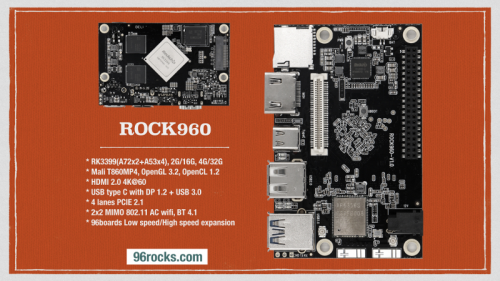Currently 96rock’s (VAMRS) Rock960 board officially published for debian stretch image for 32bit ( they aren’t published for AARCH64 ), so I rebuilt their open source for supporting nvative AARCH64 at all with bundled LXDE.
Download link:
Rock960B ( RK3399 + 4GB lpDDR3 + 32GB eMMC )
https://mega.nz/#!cp1wRSZS!Lg35IENdY7eyzCLT5PpYZc81b3XCZexUYq9n46YP_ig
Rock960C ( RK3399 + 4GB lpDDR3 + your SDcard )
https://mega.nz/#!tltgXaAB!2LSn67qzKU_93qJEw0AKv1k-4KgQP3TsQjR4MEkn6kQ
This compressed binary contains many things: seperately kernel and u-boot image. But you don’t have to flash them in each, just use rkdeveloptool in toolbin.
Walkthrough:
- Extract compressed file to somewhere to use them easily.
- Move to extracted path.
- Give permission “rkdeveloptool” binary to executive, use
$ chmod +x toolbin/rkdeveloptool
- Make your Rock960 board connected USB-C to your PC and turn to maskrom mode ( push both of maskrom and reset butttons, then release only reset )
- Your host PC ( may Linux ) should detects new USB device, then it may allow to downloading mode with rkdeveloptool.
$ sudo toolbin/rkdeveloptool db toolbin/rk3399_loader_v1.12.112.bin
- Then just write system.img to your board.
Warning : all your datas in eMMC may deleted, back up your data before doing this !$ toolbin/rkdeveloptool wl 0 system.img
- It may takes for minutes, wait for done.
- Then reset your board.
$ toolbin/rkdeveloptool rd
After boot up
You may see LXDE desktop within a minute, then connect to your WiFi, then make systems up to date with these.
$ sudo apt-get update $ sudo apt-get upgrade
How to know 64bit ?
Just make a C++ source and compile it, then run it for a test. ( before you may need get install g++ with this : sudo apt-get install g++ )
// test.cpp
// --------
#include <cstdio>
#include <cstdlib>
#include <cstring>
using namespace std;
int main( int argc, char** argv )
{
void* pTest = NULL;
if ( sizeof(pTest) == 8 )
{
printf( "Your system got 64bit pointer size.\n" );
}
else
{
printf( "Your system got 32bit pointer size.\n" );
}
return 0;
}Then,
$ g++ test.cpp -o test $ ./test Your system got 64bit pointer size. $ _
Done.
Additional build info
My AARCH64 system image build in these options –
- Default Rockchip configuration
- Not supports SOC cameras ( a.k.a MIPI-CSI )
- USB-C OTG supports as default option ( removable drive at host PC )
Recommended work to do after flashing image
- Keep update your system via ‘apt-get’
- Manage your power configuration – I don’t recommend to use power manager ( there’s many Rockchip DWM driver control errors )
Recommended for developers
- Install ‘g++’ first.
- LXDE’s X11 library is not much functional – need to consider non-acccelerated desktop graphics ( because MALi 8xx not suppors OpenGL ! – OpenGL|ES and OpenGL is not compatibled )
